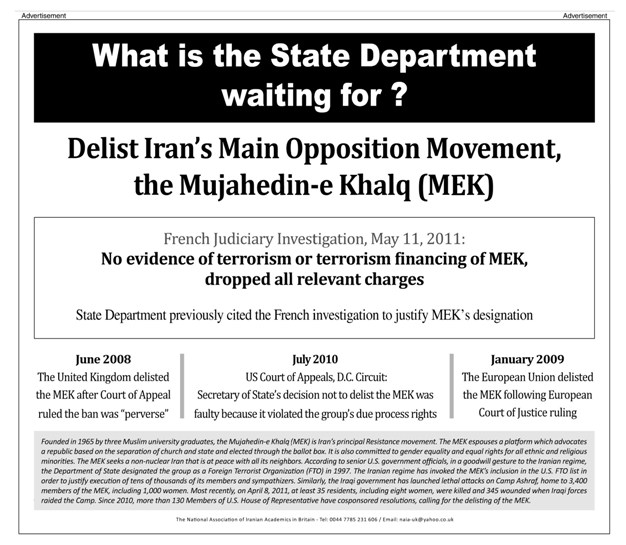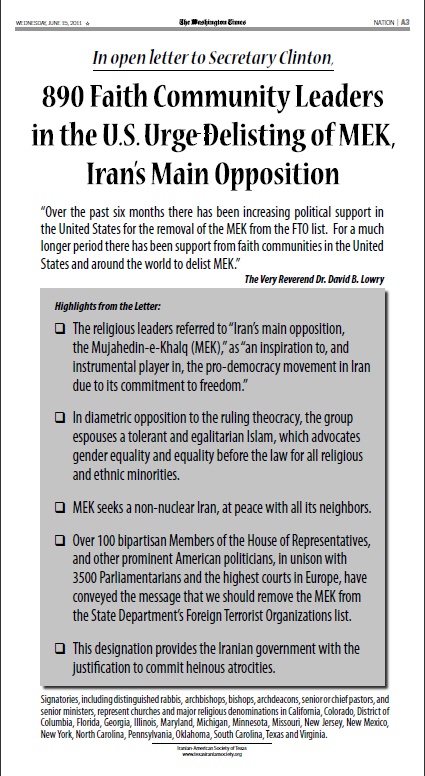Anti-Tehran group should be nurtured, not hindered.
Columbia Daily Tribune
BY KASRA NEJAT
Sunday, June 26, 2011
As protests for democracy and human rights continue in the Middle East, the world has not forgotten that for the past two years, beginning in June 2009, the Iranian people also staged nationwide uprisings. In February and March this year, tens of thousands of protesters took to the streets in Iran once again, demanding democracy and an end to the regime.
Without offering support to the Iranian people and their main opposition, the world cannot deal with the regime’s multi-faceted threats, including the mad dash toward nuclear weapons.
For the West, the expression of legitimate demands for freedoms and human rights across the Middle East has meant the era of choosing tyrannical stability over democracy as a matter of foreign policy has ended.
To alleviate concerns about the role of religious fundamentalism in the region’s future, Washington should stop talking to the fundamentalist mullahs and start listening to the Iranian people.
President Barak Obama and Secretary of State Hillary Clinton have lauded the protest movement in Iran. But, if not translated into tangible actions, words and concerns for human rights abuses are simply benign.
Just recently, the Iranian regime announced that it will triple its enriched uranium production in defiance of the international community and in a clear sign that the world needs to do more than impose sanctions on the regime. This shows the Iranian regime’s nuclear defiance, suppression at home and terrorism export are all outpacing U.S. policy. America is stuck in a reactive mode because it largely sidesteps the massive potential of the Iranian people.
Deliberate and active support for democratic change by the Iranian people and their resistance movement is an option that far outweighs appeasement or threat of war in terms of strategic benefits for both Iran and the region.
The depth and magnitude of dissent in Iran has for the past two years been strengthened with the deepening fissures at the apex of power within the regime. New political dynamics have rapidly taken shape within Iran, putting the regime at a severe disadvantage, but Washington’s policy has remained extremely stagnant.
America’s tough rhetoric against Iran will have no real weight in the eyes of the regime if it ignores Tehran’s Achilles Heel.
But, much more is at stake than just Iran. For the West, it makes absolutely no sense to expect a democratic outcome for the popular uprisings in the Middle East while at the same time engaging the fundamentalists ruling Iran. The third option of democratic change should no longer be the third rail of America’s Iran policy. It should be the first priority.
There are a number of practical steps that need to be taken to that end.
First, more comprehensive sanctions, especially an oil embargo, should be imposed against the regime, depriving it of the means to fund terrorism and extremism abroad.
Second, in contrast to its tepid reaction to the regime’s crackdown in 2009, the United States must stand tough against rights abuses. The administration’s decision on June 9 to place sanctions on the Iranian regime’s repressive forces is a good start. But more needs to be done to support the Iranian people’s aspirations for democracy.
Sadly, even in the current environment, the United States is curtailing the activities of the principal Iranian opposition, the Mujahedin-e Khalq (MEK), by keeping it on the blacklist at the behest of Tehran.
A number of distinguished former high-ranking officials from the past three administrations, including not one but three former joint chiefs of staff, seasoned U.S. diplomats, counterterrorism experts and veteran security and intelligence officials have called on Washington to delist the MEK and protect Camp Ashraf, home to 3,400 MEK members in Iraq.
The United States must immediately delist the MEK, as both a Federal Appeals Court in DC and dozens of bipartisan lawmakers have called for.
Representatives William Lacy Clay and Emanuel Cleaver are among some 80 bipartisan lawmakers who have so far endorsed House Resolution 60, which calls on the secretary of state to delist the MEK.
That should be done immediately.
Kasra Nejat is president of the Iranian American Cultural Association of Missouri, which is based in St. Louis.
http://www.columbiatribune.com/news/2011/jun/26/us-policy-toward-iran-is-stagnant/

